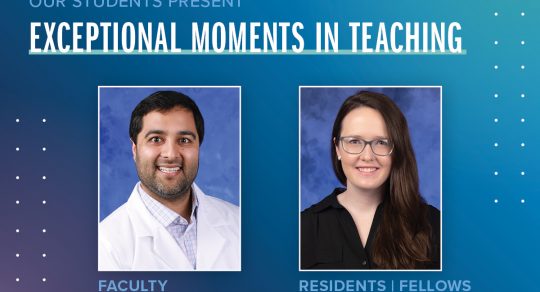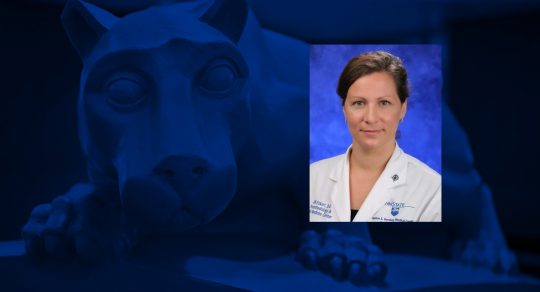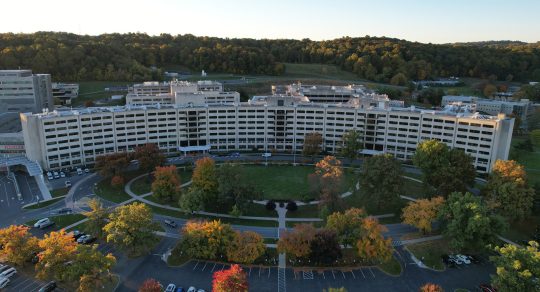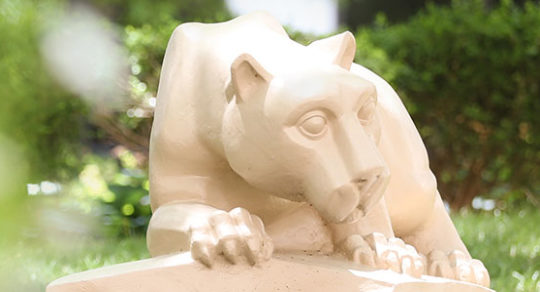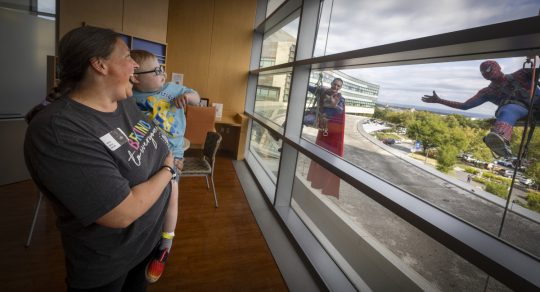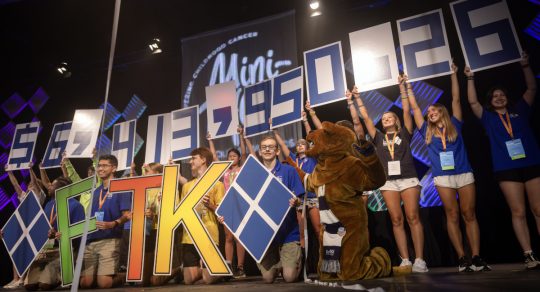Fellowship
Pediatric Anesthesiology
The Pediatric Anesthesiology Fellowship at Penn State Health Milton S. Hershey Medical Center/Penn State Health Children's Hospital is a one-year, ACGME-accredited program that admits two fellows per year.
Explore More
The Pediatric Anesthesiology Fellowship strives to be pediatric patient and trainee advocates, helping to achieve excellence in education, patient safety and patient care. We aim to inspire excellence, innovation and dedication in the field of pediatric anesthesiology. This program aspires to be a model pediatric anesthesiology fellowship program, training fellows who are capable of independent subspecialty consultant-level care, and who are able to become leaders in academic and private pediatric anesthesiology.

Program Overview
Maintain outstanding levels of collegiality, professionalism and teamwork
Teach skills, knowledge and practices that foster excellent performance in the clinical and academic arenas
Emphasize the institution’s core values of respect, integrity, teamwork and excellence
Learn More about the Fellowship
General Application Information
All applicants must apply through the SF Match.
Applications are considered without regard to race, religion, gender, orientation or national origin.
Application requirements
All applicants must:
Successfully complete an ACGME-accredited anesthesiology residency
Successfully pass the American Board of Anesthesiology basic exam during residency training
Be qualified to register for the American Board of Anesthesiology advanced and applied certification process
Successfully complete USMLE Steps 1, 2 and 3
Have current certification in ACLS (it is strongly encouraged for applicants to have current certification in PALS)
Required Supporting Documents
In addition to the SF Match application, the following documents should be submitted via email to rsant@pennstatehealth.psu.edu:
Current curriculum vitae
Current ISTE scores
ABA basic exam results
Eligibility
Qualified candidates must be:
U.S. citizens, permanent residents or J-1 visa holders (no additional visa types are sponsored)
Board-eligible or board-certified in anesthesiology
Eligible for a Pennsylvania medical training license
Interview Process
Interviews will be conducted remotely. All fellowship applications must still be submitted through SF Match and applicants will receive further communication via the SF Match system.
Interviews will begin in late March 2024.
Current Fellow
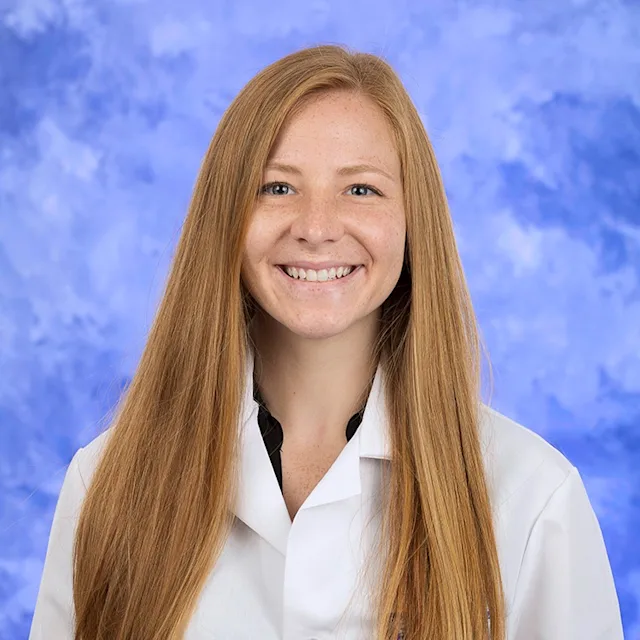
PGY-5 Fellow, Pediatric Anesthesiology Fellowship
Leadership



Program Coordinator, Anesthesiology Residency, Anesthesiology and Perioperative Medicine
Supporting Your Training
Curriculum Details
Fellows' clinical experiences are based on monthly rotations in these departments:
Operating rooms
Pediatric ICU
Neonatal ICU
Pain
Pulmonary
Formal didactic curriculum includes:
Weekly fellow-level lectures
Departmental functions that include Grand Rounds and case conferences
All fellows will also:
Engage in a scholarly project, for which they are allowed a large amount of non-clinical time
Take part as a teacher as well as a learner by developing and giving lectures to residents, and often by functioning as junior attendings and overseeing residents in the ORs
The Pediatric Anesthesiology Fellowship curriculum and objectives are designed to provide a broad exposure to the perioperative management of all elements of anesthesiology relating to the care of neonatal and pediatric patients. This includes, but is not limited to, preoperative evaluation and assessment, intra-operative management of simple and complex patients and cases, postoperative management, pain management and neonatal and pediatric critical care.
Structured didactic lectures, self-directed learning, Grand Rounds conference, teaching opportunities and an academic project will supplement the clinical experience. Intraoperative teaching in the operating room is the mainstay of all didactics and performance assessment of the fellowship.
The clinical rotation for fellows includes seven pediatric perioperative anesthesia months, including cases in:
ENT
General
Neonatal
Neurosurgery
Off-site anesthesia (MRI, CT, nuclear medicine, interventional radiology)
Ophthalmology
Orthopaedics
Plastics
Transplant
Trauma
Urology
The program also includes:
One and a half to two and a half months of pediatric cardiac anesthesia
One month of pediatric ICU
One month of neonatal ICU
One month of pediatric pain and regional anesthesia
Half a month of pediatric pulmonary medicine
Trainees in the Pediatric Anesthesiology Fellowship review the OR schedules one to two days in advance.
Fellows are encouraged to ask for specific ORs/cases that offer the best educational value for them. This way, fellows can advance their own clinical growth. Guided by the program director, they can also make sure they work with a broad range of complex pediatric cases.
Recent fellows have achieved case numbers that are much higher than the national fellow averages (index cases) for most types of cases.
Didactics in the Pediatric Anesthesiology Fellowship include:
Pediatric fellows' lecture series (weekly, fellow-level, covers entire ACGME curriculum)
Grand Rounds (weekly)
Anesthesiology fellows' lecture series (six to eight lectures on practical topics, designed to prepare fellows for the ABA pediatric sub-specialty board exam)
Pediatric anesthesiology fellow simulation sessions
Each fellow will have the chance to join in an overseas mission trip. The purpose of the trip is to offer pediatric anesthesiology services to areas of the world that do not get the health care they need.
The trip:
Is joined by a member of Penn State Health Milton S. Hershey Medical Center's pediatric anesthesiology faculty
Usually lasts 10 to 14 days
Includes non-clinical time and trip funds provided by the department
Fellows have access to the following resources:
Fellows' office space
Electronic medical record system, which includes anesthesia records
Dedicated ultrasound machine for pediatric regional anesthesia
Comprehensive airway equipment:
A number of videolaryngoscopes
Fiberoptic laryngoscopes that include pediatric and neonatal blades
Harrell Health Sciences Library, including online resources, journals and texts
Physical university anesthesia library with a complete pediatric text collection
All trainees in the Pediatric Anesthesiology Fellowship must complete a scholarly project. Topics can include bench research, clinical research or quality improvement/quality assurance.
Projects are mentored by Penn State Health Milton S. Hershey Medical Center faculty. A deliverable is required (abstract, poster, manuscript, etc.)
Non-clinical time is offered (about one academic day per week) for completion of this project.
Each fellow must develop and give one one-hour lecture to anesthesiology residents.
In addition, fellows are given more responsibility in the operating rooms over time. This is decided by formal and informal assessments. Toward the end of the fellowship, most fellows will have the chance to supervise residents in the ORs. This presents chances to:
Build management and teaching skills
Help the fellow move from trainee to consultant attending
Each fellow will receive:
Three weeks' vacation
One week of CME time (meetings, etc.)
Added time for presenting posters or talks (allowed on a case-by-case basis)
Fellow Honors and Recognitions
Penn State College of Medicine and Penn State Health Milton S. Hershey Medical Center accept ongoing nominations for the Exceptional Moments in Teaching award.
The award, given monthly by the Office for a Respectful Learning Environment, accepts nominations from College of Medicine students who are invited to submit narratives about faculty members, residents, fellows, nurses or any other educators who challenge them and provide an exceptional learning experience. See more about the award here.
Previous nominees from the Pediatric Anesthesiology Fellowship are listed here.
The annual Resident/Fellow Research Day is held each year (with exception of during the COVID-19 pandemic) on and around the Penn State Health Milton S. Hershey Medical Center campus.
The intent of the event is to provide an opportunity for residents and fellows to showcase their research accomplishments to their peers in other clinical departments, as well as their colleagues in the basic sciences.
Learn more about Resident/Fellow Research Day here.
Previous presentations from the Pediatric Anesthesiology Fellowship are listed here.
Contact Information
Mailing Address
Gregory Weller, MD, PhD
Pediatric Anesthesiology Fellowship Director
c/o Rachel Sant, Fellowship Coordinator
Penn State Health Milton S. Hershey Medical Center
Department of Anesthesiology and Perioperative Medicine
500 University Dr., H187
Hershey, PA 17033
General Contact Information
Phone: 717-531-6489
Fax: 717-531-0826
Email: rsant@pennstatehealth.psu.edu
